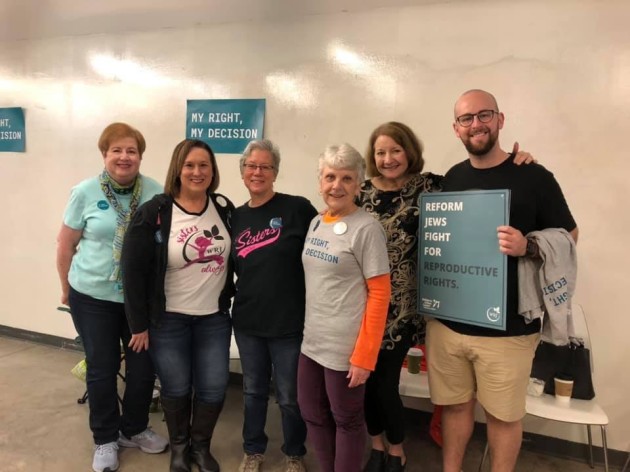The Lilith Blog 1 of 2
March 13, 2020 Jennifer Daley
When the Jewish Fight for Abortion Came to My Own Backyard
My mother likes to say that I’ve been involved with social justice since I was in the womb. I trick-or-treated for UNICEF and tagged along with her to B’nai Brith Women meetings and pro-choice rallies starting in the 1970s.
I am now Women of Reform Judaism (WRJ) Southwest District President, where I lead Reform Jewish sisterhoods in eight states across the Southwest. It has been so meaningful to lead this group of women and build power to fight for our rights in a time when Southern lawmakers seem more eager than ever to restrict them.
To this end, WRJ launched our Reproductive Health & Rights Campaign last May, in partnership with the Religious Action Center of Reform Judaism, to build an organizing framework for sisterhoods and other Reform communities to advocate for reproductive rights at all levels of government. I have felt increasingly empowered by the training provided through the campaign over the last nine months, and I have enjoyed traveling to various states in my district and speaking to sisterhoods about the history and importance of reproductive rights.
Then the issue fell in my own backyard.
On March 4, the U.S. Supreme Court heard oral arguments in June Medical Services v. Russo, a case testing the constitutionality of Act 620, a restrictive law in my home state of Louisiana that requires abortion providers to jump through medically unnecessary hoops to continue operating.
Louisiana lawmakers claim the law protects patients. But abortion is already one of the safest medical procedures — women are more likely to die from childbirth than abortion– and the law would likely to force all but one abortion clinic in my state to close, leaving one physician to provide abortion care in a state with over one million women of reproductive age.
For the women of Louisiana, it’s already tough enough: there are only three abortion clinics left statewide; there is a mandatory ultrasound; a 23-point consent form; and a 24-hour waiting period. Abortion is still legal, but it is an enormous undertaking. And that’s for a patient who can afford it. The waiting period alone pushes abortion out of reach for those traveling to a clinic by adding lodging expenses to the cost of the procedure itself – all in a state where the minimum wage is just $7.25.
The case also has national significance, because in 2016 the Supreme Court struck down a nearly identical targeted regulation of abortion providers (TRAP) law in Texas in the landmark Whole Women’s Health v. Hellerstedt. The justices found that Texas’ law unconstitutionally burdened patients seeking abortions. If the justices allow Louisiana’s law to stand, they would be effectively overturning the Whole Women’s Health precedent set less than four years ago and would open the door for other states seeking to erode abortion access.
I knew I couldn’t be passive while the Supreme Court considered making a bad situation worse for the people of my home state, and the country at large.
On the day of the oral arguments, I attended the #MyRightMyDecision rally in New Orleans. The morning began with the women of my sisterhood at Congregation Gates of Prayer, who joined me for an opening prayer before the rally began. We prayed for those working for reproductive health, rights, and justice to be granted perseverance, strength, and courage. We prayed that the nine Supreme Court justices be granted wisdom and compassion.

Once the rally began, I was honored to share with the rally participants a bit of what Judaism has taught me about abortion and a woman’s right to choose.
My faith has taught me that all human beings are created b’tzelem Elohim – in the image of God and that my body is my sacred vessel.
My faith has taught me that a woman is a human being, but a fetus is not a life until it is born.
My faith has taught me that the health of a woman – her physical, emotional and psychological well-being – must take precedence over the fetus that she carries inside her.
Most importantly, Judaism has taught me that my highest obligation is to preserve life — that to save a life is to save the world. The preservation of a human soul is my most sacred task, and I cannot stand idly by while the blood of my neighbor is shed.
People of faith who are opposed to reproductive rights on religious grounds do not hold a monopoly on the conversation and they don’t represent me. It is my responsibility to speak up as a Woman of Reform Judaism and a Louisianan, and I will proudly continue to do so as long as it is needed, just like I was born to do.
Jennifer Daley is Women of Reform Judaism (WRJ) Southwest District President and a member of Congregation Gates of Prayer in Metairie, Louisiana.
 Please wait...
Please wait...